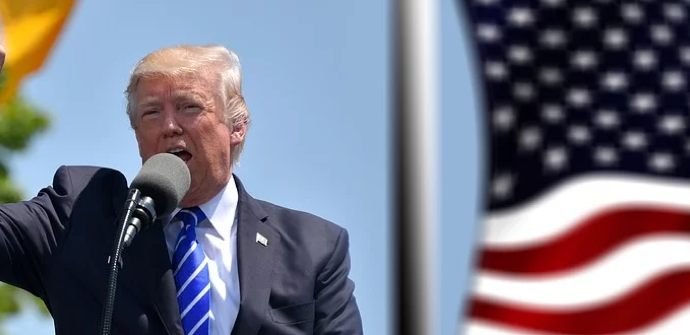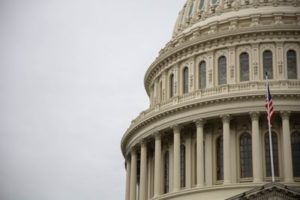
Major constitutional questions arise during impeachment proceedings
News February 7, 2020, Comments Off 33On July 25, 2019, President Donald Trump had a phone call with Ukrainian President Volodymyr Zelensky. A since-unclassified transcript of the call revealed that the President made a private request of President Zelensky to “look into” his political rival Joe Biden in an effort to find an angle to use against Biden in the 2020 presidential election.
This phone call became the center point of one of the most important moments of Trump’s presidency: his impeachment. The House of Representatives, following reports from a C.I.A. whistleblower, uncovered what they believe evidence that President Trump abused his power for personal political gain, which Democrats argue threatens United States national interest.
In December of 2019, the House passed articles of impeachment against President Trump to the Senate, charging him with abuse of power during the phone call and obstruction of Congress following his orders to those close to him to not share information with House investigators.

Photo via unsplash.com
Since then, the impeachment trial has been one of the most closely scrutinized Senate proceedings of Trump’s presidency.
What does “impeachment” mean?
Section 3 of Article I of the Constitution reads that “The Senate shall have the sole power to try all impeachments.” Judgment by Congress is limited to removal from office and a ban from holding office under the United States government. It goes on to say that additional justice may be required to determine additional punishments under due process of law.
Grounds for impeachment are defined in Article II, section 4 as “treason, bribery, or other high crimes and misdemeanors.” This is where the infamous flexibility and vagueness of the United States Constitution complicates proceedings. Two of the four impeachable offenses are easy to define, treason and bribery, but high crimes and misdemeanors can mean anything.
The president is allowed Constitutional freedom to use their power in any way that benefits national interest in a way that members of Congress do not view as abuses of power by an elected executive. None of the text surrounding impeachment in the Constitution, however, gives examples of “abuses of power” or “high crimes and misdemeanors.” Modern members of Congress must rely on historical precedent and legal theory to determine what a high crime or misdemeanor might be.
The vote on witnesses
On Friday, Jan. 31, 2020, the Senate voted 51-49 to reject calls for additional witnesses and evidence. Only two Republicans, Senators Susan Collins of Maine and Mitt Romney of Utah, joined Democrats in requesting additional information regarding the case.
“The House chose to send articles of impeachment that are rushed and flawed,” Senator Lisa Murkowski, R-Alaska, stated. Her vote was a crucial one for Republicans, who were not sure where she stood regarding lengthening the trial.

Photo via unsplash.com
Democrats claim that not hearing additional testimony and evidence is dangerous to American politics. House impeachment managers said in a joint statement that Senators voting against more witnesses “set a dangerous precedent that will have long-lasting repercussions for the United States Congress, the balance of powers, and our democracy as a whole.”
Definition of “high crimes and misdemeanors”
“I don’t need to hear any more evidence that the president did what he is charged with doing,” Sen. Lamar Alexander, R-Tenn., told the press before Friday’s vote. “If you’ve got eight witnesses saying that you left the scene of an accident, you don’t need nine.”
Alexander shares the same view as many Senate Republicans, stating that there is a “big gap” between the president’s actions and treason, bribery, high crimes or misdemeanors. This was a major factor in Friday’s vote, as most Republicans did not believe that any additional information about the president’s actions in Ukraine could convince them that an impeachable offense had been committed.
Alan Dershowitz, attorney for President Trump, argues that the president can engage in a quid pro quo (favor or advantage granted or expected in return for something) for personal benefit. Dershowitz made the argument that if the president believes sincerely that their reelection is in the national interest, as presidents are like to do, then that is protected by the Constitution’s vagueness on presidential powers and freedoms.
Rep. Adam Schiff, D-Calif., lead House manager prosecuting the case against the president, argues that this would establish precedence for a president to abuse their power for political gain, especially in areas such as foreign policy that are reliant on the president to lead.
Senate Minority Leader Chuck Schumer, D-N.Y., argues that if such a legal view was taken in the past, such as in the Nixon impeachment, previous presidents would also be absolved of clear wrongdoing. This sparks debate about the intention of the Framers regarding Congress’s power to check the actions of the president, which ties back again to the vagueness of the Constitution’s actual text.
Mr. Dershowitz has since claimed that his statements were taken out of context and misconstrued by media coverage. These remarks, mostly made on social media platforms like Twitter, contribute to the stance against “fake news” that the Trump administration has become known for. The declaration of “fake news” has been a staple of President Trump’s political following since the 2016 campaign.

Photo via unsplash.com
Public reaction
FiveThirtyEight, a website that tracks polls, found that 48.2% of all Americans support removing Trump from office. 84.1% of Democrats support removal, while only 9.4% of Republicans do. This highlights the increased partisanship the United States has been seeing in recent years.
According to ABC News and the Washington Post on January 24, President Trump is the first president in modern history to fail to achieve majority approval in polls, with 51% of respondents disapproving of Trump’s first term. These polls also reveal that 66% of respondents believed that the Senate should have called new witnesses.
The Final Vote
On Wednesday, February 5, the Senate, voted 52-48 to acquit President Trump of abuse of power and 53-47 on obstruction of Congress. The vote represents party solidarity among Democrats and few Republicans crossing the aisle. President Trump is moving forward with his campaign for reelection, now that impeachment proceedings are behind him.
Written by Forest Swisher.